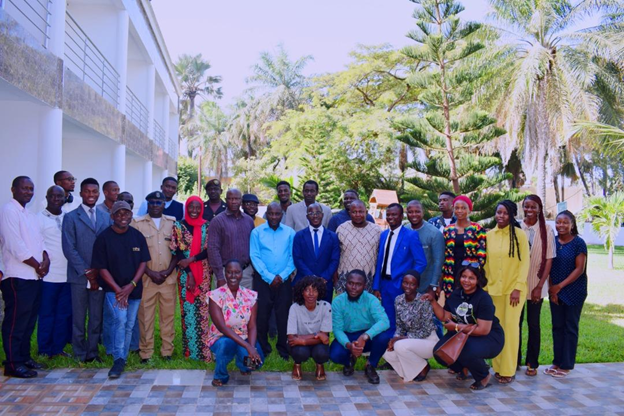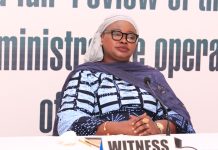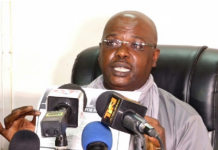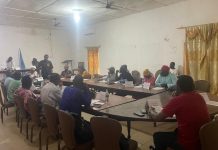By Mustapha Jallow
Gambians from Civil Society Organisations (CSOs), the media, University of The Gambia (UTG) and senior staff of the government, have renewed their calls to the Barrow led administration to fast-track promulgation of the 2020 National Security Council Bill into Law. This they said, will help set the legal bases for the Office for National Security and speed up the implementation process of the Security Sector Reforms (SSR).
The joint calls were made at a day long forum organised by the Office for National Security (ONS) in collaboration with the Center for Research and Policy Development (CRPD). Funded by the African Transitional Justice and Legal Fund (ATJLF), the session brought together social and human rights activists, journalists, law-students, senior government staff and members of the security services.
The stakeholders also pressured President Barrow’s government to resuscitate the Draft Constitution.
“Until now, the Gambia Armed Forces Act remains unchanged, together with the police Act, the Prisons Act, the Drugs Control Act, and the National Intelligence Agency (NIA) Act. These Acts are necessary to change in order to address some deficiencies and ensure delivery and national stability,” Madi Jobarteh, a human rights activist said.
Jobarteh who doubles as the Director of Westminster Foundation in Gambia, recalled how most security institutions were undermined and abuse in perpetrating various forms of violence during the time of ex-dictator Yahya Jammeh, saying there were urgent need to cleanse these institution as well as their mentalities in bringing them under democratic dispensation. He said security sector reform entails many issues including passion, laws, policies, performance and delivery, welfare of the men and women in uniform and how they are to be addressed; that ONS is still without an existing law that defines its relation with the NIA, Police, Immigration, Office of the President among other security outfits.
“I think ONS needs to look into these issues seriously. If you look at our police stations you will realise that they need to be rehabilitated including the Mile Two Prison. Beyond that the salaries and welfare too, needs to be addressed and not to mention certain practices that still prevails including the issues of the check-points. Also, the ways and manners of arrest are been done, the issue of bail all these issues needs to be addressed,” he suggested.
Sait Matty Jaw, the co-founder and Executive Director for the Centre for Research and Policy Development (CRPD) stated that the dialogue was very important and timely as it is meant to showcase the work of the Office for National Security (ONS), while applauding the African Transitional Justice Legal Fund (ATJLF) for bankrolling the confab for the civil societies and the media.
Cherno Gaye, who works for Activista Gambia said implementing the security sector reform processes will practically be impossible without the Promulgation of the National Security Council Act of 2020, which outlined the modus operandi of the ONS as well as the SSR, urging the Gambia Government to take the bold step to resuscitate the Draft Constitution that was primarily designed to replace the 1997 Constitution and correct all the wrongs of the passed regime. He said if the Gambia Government is not ready to bring back the Draft Constitution, it must look for ways of amending the 1997 Constitution that will adequately address the many legal challenges confronting the nation.
Gaye believes that if President Barrow and his cabinet can amend the issue of age limit and protection of the seating National Assembly members when dismissed by their political parties they should also be willing to bring back the Draft Constitution or make amendment of the 1997 Constitution.
Abraham K. Mendy, Chief of Staff at the Office for National Security (ONS), observed the importance of the security sector reform as a catalyst for nation development, observing that his office has not been relenting on its core mandate since inception as depicted by the many initiatives bankroll the ONS in propelling the reforms process. He pointed-out that ONS has been able to formulate of the Draft National Security Council Bill and it’s validation, auditing of the personal of the security forces for rightsizing or downsizing, development of arrest and detention manual, drafting of the Security Sector Reform Strategy and the National Security Strategy documents among others, adding that all these initiatives are locally funded by the Government of the Gambia without any support from donor partners. He described the forum as an important avenue to sell the program and activities of ONS to stakeholders including the public, as well as to sensitize the masses about the operation of the ONS. He said some of the challenges facing his institution includes the reluctance of some key stakeholders in embracing the security sector reform agenda, lack of budget from the government to support security sector reform, coordination of partners support, failure of citizens to take ownership of the reform process, and civil-security relationship among others.




















